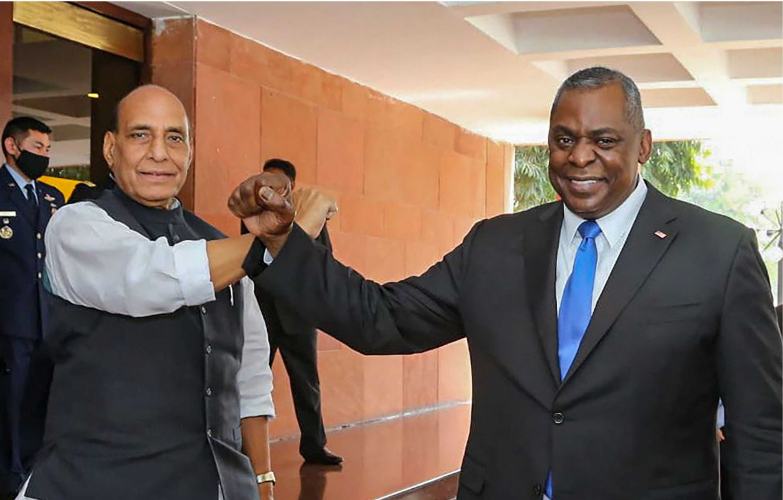
Indian Defence Minister Rajnath Singh and US Secretary of Defence Lloyd James Austin III at Vigyan Bhawan in New Delhi, Saturday, March 20, 2021. A PTI Photo
NEW DELHI (PTI): India and the US have resolved to further expand their robust defence ties through deeper military-to-military engagement and logistic support, with the US describing the partnership as a "stronghold" of a free and open Indo-Pacific amidst China's growing assertiveness in the region.
After holding wide-ranging talks with Defence Minister Rajnath Singh, US Defence Secretary Lloyd Austin last Saturday said elevating the Indo-US defence partnership is a "priority" of the Biden administration, and that India is an increasingly important partner amid rapidly shifting international dynamics and a "central pillar" in Washington's approach towards the region.
"I reaffirmed our commitment to a comprehensive and forward-looking defence partnership with India as a central pillar of our approach to the region," he said, in a clear indication of the new US administration's foreign policy priorities.
Describing the talks as "comprehensive and fruitful", Singh said they agreed to enhance cooperation between Indian military and the US Indo-Pacific Command, Central Command and Africa Command, and that both sides are keen to work together to realise the full potential of the India-US comprehensive global strategic partnership.
It is understood that China's aggressive behaviour in Eastern Ladakh figured the talks.
Referring to Indo-US foundational agreements on defence cooperation, Singh said both sides discussed steps to be taken to realise the full potential of pacts such as LEMOA (Logistics Exchange Memorandum of Agreement), COMCASA (Communications Compatibility and Security Agreement) and BECA (Basic Exchange and Cooperation Agreement).
Singh also said the recent summit of leaders of India, the US, Japan and Australia under the Quad framework emphasised the resolve to maintain a free, open and inclusive Indo-Pacific region.
"India is committed to further consolidate our robust defence partnership with the US. I look forward to working with you closely to make the India-US relationship one of the defining partnerships of 21st century," Singh said.
In his media statement Austin, who arrived here on a three-day visit on Friday, said India is an increasingly important partner amid rapidly shifting international dynamics and Washington was committed to a "forward-looking" defence partnership with New Delhi as a central pillar of its approach to the region.
"As the world faces a global pandemic and growing challenges to an open and stable international system, the US-India relationship is a stronghold of a free and open Indo-Pacific region," he said.
The US Defence Secretary said as the Indo-Pacific region faces challenges to a free and open regional order, cooperation among like-minded countries is imperative to securing the shared vision for the future.
"We discussed opportunities to elevate the US-India Major Defence Partnership...a priority of the Biden-Harris Administration through regional security cooperation, military-to-military interactions, and defence trade," Austin said.
In addition, the two sides are continuing to advance new areas of collaboration, including information-sharing, logistics cooperation, artificial intelligence; and cooperation in new domains such as space and cyber, he added.
Describing his talks with Singh were "productive", he said a number of security issues which are important to the two countries were discussed.
"As the Indo-Pacific region faces acute transnational challenges, such as climate change, and challenges to a free and open regional order, cooperation among like-minded countries is imperative to securing our shared vision for the future," he said.
"Despite today's challenging security environment, the partnership between the US and India, the world's two largest democracies, remains resilient and strong and we will seek every opportunity to build upon this major partnership," he added.
In his comments, Austin also referred to Prime Minister Narendra Modi's comments that India stands for "freedom of navigation and overflight, unimpeded lawful commerce, and adherence to international law."
"This is a resounding affirmation of our shared vision for regional security in the Indo-Pacific. And it's clear that the importance of this partnership, and its impact to the international rules-based order will only grow in the years ahead," he said.
He said there was a discussion on engagement with like-minded partners through multilateral groupings such as the Quad and ASEAN. The 10-nation ASEAN (Association of Southeast Asian Nations) is a key stakeholder in the Indo-Pacific region.
It is learnt that India's plan to procure around 30 multi-mission armed Predator drones from the US for the three services at an estimated cost of over USD 3 billion also figured in the talks.
The medium-altitude long-endurance (MALE) Predator-B drones, manufactured by US defence major General Atomics, are capable of remaining airborne for around 35 hours and can hunt down targets at land and sea.
The US Defence Secretary began his statement by condoling the death of a Group Captain of the Indian Air Force in a crash involving a Mig-21 Bison aircraft in Gwalior this week.
"First and foremost, I would like to express my deepest condolences for the tragic accident that killed an Indian Air Force pilot earlier this week," Austin said.
Group Captain Ashish Gupta was killed in the accident on Wednesday when his aircraft went down after taking off for a combat training mission.
The issue of India procuring a batch of S-400 air-defence missiles from Russia is learnt to have figured in the talks.
In October 2018, India signed a USD 5 billion deal with Russia to buy five units of the S-400 air defence missile systems, notwithstanding a warning from the Trump administration that going ahead with the contract may invite US sanctions.
Recently, the US imposed sanctions on Turkey under the Countering America's Adversaries Through Sanctions Act (CAATSA) for purchase of S-400 missiles from Russia.
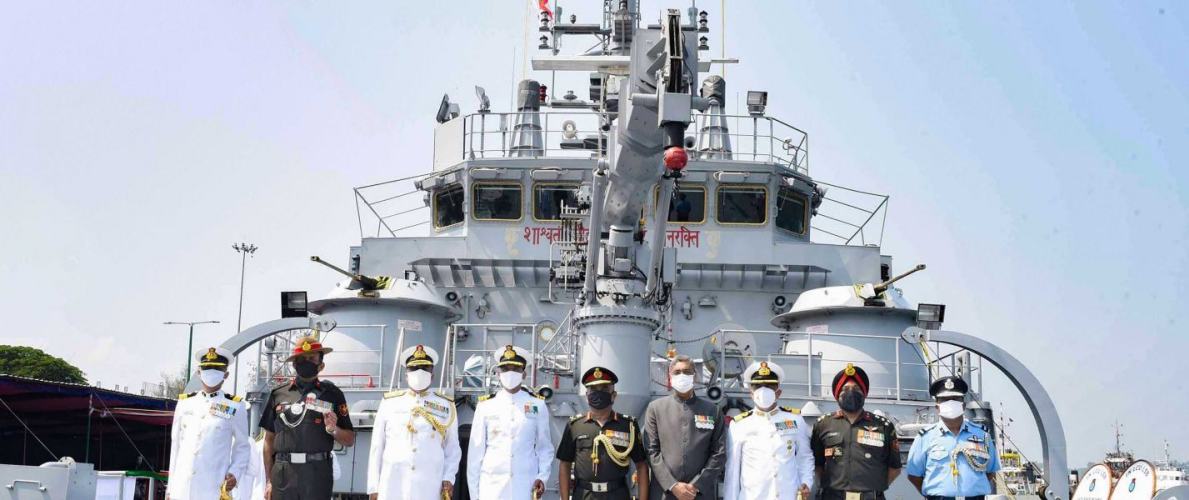 Previous Article
Previous Article Next Article
Next Article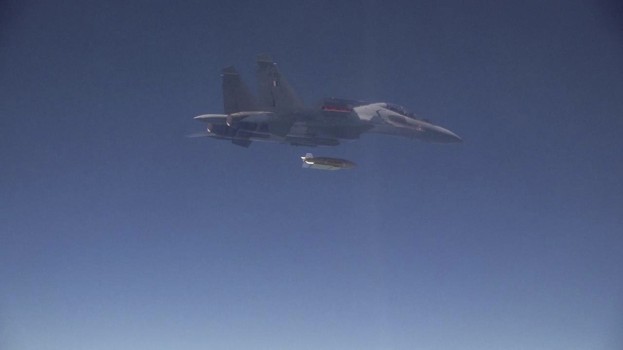
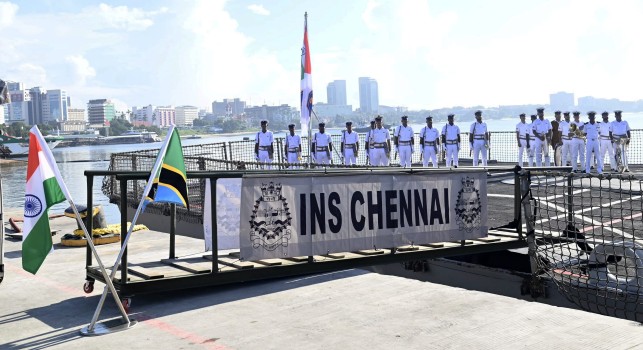
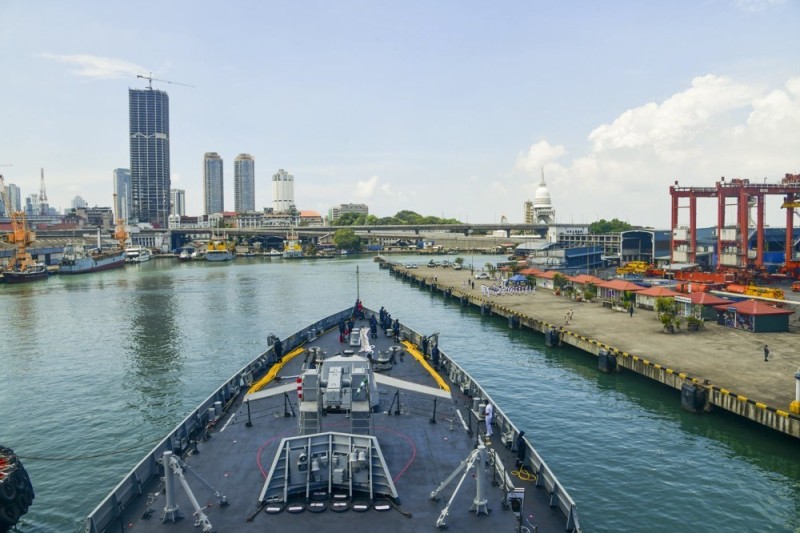










The Indian Air Force, in its flight trials evaluation report submitted before the Defence Ministry l..
view articleAn insight into the Medium Multi-Role Combat Aircraft competition...
view articleSky enthusiasts can now spot the International Space Station (ISS) commanded by Indian-American astr..
view article